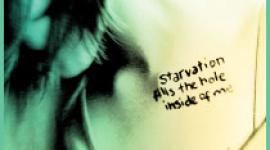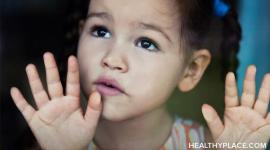Loss and Bulimia
Loss is a part of life
 We all undergo many losses, real and imagined. My father died 32 years ago. I was 20 then. I am almost the same age he was when he had his fatal car accident. His death was the greatest "real" loss of my life. My eating disorder began a year later.
We all undergo many losses, real and imagined. My father died 32 years ago. I was 20 then. I am almost the same age he was when he had his fatal car accident. His death was the greatest "real" loss of my life. My eating disorder began a year later.
But I am not alone. In fact, I have never met a person who has bulimia who did not suffer a life-changing loss. Some people lose their parents through death or divorce. Others feel a loss when a sister or brother goes off to college or marries. Or when we move to a new town and lose our friends.
Some of us mourn the loss of childhood, or of a childhood dream. Sometimes bodies betray us. Young ballerinas become too big-chested to perform professionally. High school valedictorians discover that they are only average students once they attend a good college.
We also lose face after wetting the bed at camp, receiving a a scolding from the teacher in front of the class, or being demoted from the first reading group.
Friendships and love relationships leave us especially vulnerable to loss. Your best friend may betray you, or move away. Your boyfriend may leave you for another girl.
Sadly, some of us are physically or sexually abused, which causes us to lose not only our innocence but our capacity to trust. We also lose our body as a part of us that we love and enjoy. Once we become alienated from our bodies, we are prone to hate and hurt them.
Even those of us who grew up in close, seemingly healthy families can also suffer loss, though in more subtle ways. Some parents need us to remain dependent on them so that they never have to deal with their own issues. They stifle our efforts at independence by withdrawing their love and support. They may reject our friends and suitors, and make comments like, "Oh, I guess we can't talk to you anymore, now that you're a college girl..." or, "It's obvious that you like your boyfriend more than us, so why should we invite you to dinner?" To hear comments like these is to suffer a thousand deaths.
Some of these losses roll off the backs of other people -- but not ours! We tend to dwell on what we have lost, and often we blame ourselves. "If only I weren't so bad, or so fat," we say, "If only I were better, then this wouldn't have happened."
We Blame Ourselves
In our minds, the loss is all our fault. Shame and guilt fill us. Looking for a way to punish ourselves, we use our bodies, concluding wrongly, "If I were thin enough, everything would be better." So we eat to fill the empty feeling left by the loss, and we throw up to hurt ourselves, and to keep ourselves from getting fat.
If we can't control our losses, at least we can control our bodies. Eating becomes the one area in our lives where we feel in charge. We alone can determine what's kept and what's lost.
Ironically, the act that once made us feel in control ultimately takes control of us. The trap is set and we are caught.
Breaking Free
What can we do to free ourselves?
First, examine your basic assumption. You didn't suffer a loss because you were bad or fat. You suffered a loss because LOSS HAPPENS.
Sometimes other people are at fault; sometimes, it's no one's fault. It's just life.
And if you base your life on the faulty assumption that you are bad and need to be punished, you can lose your health and your life-- over nothing.
Count Your Losses -- Not Your Calories
You can work through your losses in treatment, but first you have to realize what they are.
Make a time-line of your life for as far back as you can remember. List the events that knocked you down, no matter how small or silly they seem. Today you may laugh at the recollection that someone called you "chubby" when you were twelve -- but you didn't laugh then.
Think about those losses -- real and imagined. What did they do to you? How did you cope with the pain and grief? Did you stuff it down and throw it up, as a metaphor for your hurt feelings?
One thing is for sure. Bingeing and purging won't bring back what is gone, and won't make the pain go away. And being thin is not a guarantee against future loss.
Reflection, understanding, an attitude shift, and the support of a professional -- these can help you understand your internal life. These are the seeds of change.
Linking loss and bulimia is the first step toward recovery.
Did you know?
"Et lux in tenebris lucet" means, "The light shineth before the darkness."
Judith Recommends
To understand how a young girl deals with loss and grief, I recommend THE MEMBER OF THE WEDDING, by Carson McCullers.
In this poignant novel, Frankie, a 12-year-old Georgia tomboy, grapples with devastating losses -- the death of her parents, the marriage of her beloved brother, and a traumatizing sexual experience -- all of which would make her a prime candidate for developing an eating disorder. Yet she doesn't. Find out why. Her story will inspire you.
I also recommend "Party of Five" on Fox TV (Tuesday nights). Neve Campbell plays Julia, one of five siblings who lost their parents in a car accident when they were young. Julia goes through a divorce, leaves for college, and then is physically abused by her boyfriend. She is also a good candidate for an eating disorder -- so many early losses and blows to her self-esteem. Will she?...
next: Reworking the Myth of Personal Incompetence: Group Psychotherapy for Bulimia Nervosa
~ all Beat Bulimia articles
~ eating disorders library
~ all articles on eating disorders
APA Reference
Staff, H.
(2008, December 3). Loss and Bulimia, HealthyPlace. Retrieved
on 2026, March 4 from https://www.healthyplace.com/eating-disorders/articles/loss-and-bulimia



